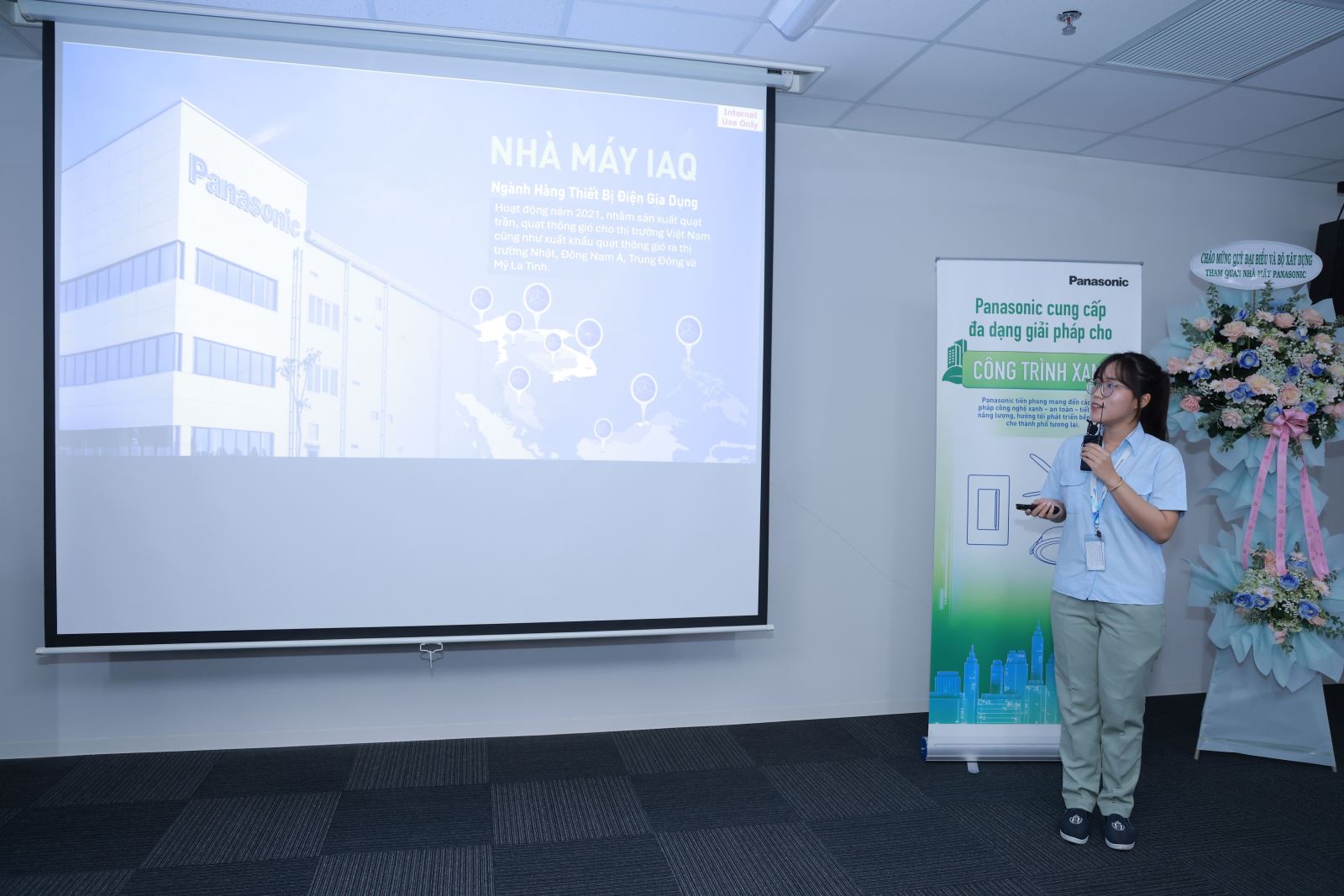As part of the Vietnam Green Building and Green Transport Week 2025 organized by the Ministry of Construction, on October 28th, 2025, a delegation from the Ministry, along with representatives from various agencies, organizations, and enterprises, conducted a field visit to the IAQ and ECM factories of Panasonic Electric Works Vietnam in Ho Chi Minh City.
This activity is part of ongoing efforts to promote communication and encourage environmentally friendly, green production models within the construction sector, contributing to the realization of sustainable development goals and the reduction of greenhouse gas emissions.
Speaking during the field visit, Mr. Nguyễn Hữu Tiến, Deputy Director General of the Department of Science, Technology, Environment and Building Materials (Ministry of Construction), evaluated Panasonic’s factory model as an outstanding example of green technology application and smart manufacturing. He emphasized that the combination of technological innovation, creativity, and environmental consciousness serves as the foundation for sustainable business development, while also opening new directions for Vietnam’s green materials and construction industry.
.jpeg)
Mr. Nguyen Huu Tien - Deputy Director of the Department of Science, Technology, Environment and Construction Materials spoke at the survey.
“The field visit provided an opportunity for regulatory agencies, experts, and enterprises to exchange experiences, strengthen cooperation, and replicate green and smart production models nationwide,” Tien said
On behalf of the enterprise, Mr. Masashi Sakabe, General Director of Panasonic Electric Works Vietnam, affirmed that Panasonic’s development philosophy has always placed people and the environment at its core. He shared: “Panasonic wishes to contribute to building a green, modern, and sustainable Vietnam by providing green technology solutions in the fields of electricity, water, and air.”
Panasonic’s IAQ and ECM factories are designed and operated according to advanced standards, applying a highly automated and closed production process, saving energy and minimizing CO2 emissions. These efforts are part of the company’s global “Panasonic GREEN IMPACT” strategy, which aims to achieve net-zero emissions by 2030 and reduces 300 million tons of CO2 worldwide by 2050.
According to Mr. Sakabe, the factory in Bình Dương is regarded as one of the group’s key production hubs in Southeast Asia, equipped with technology equivalent to the Tsu factory in Japan, reflecting Panasonic’s long-term commitment to investment in Vietnam.
The delegation from the Ministry of Construction visited the production areas, inspection lines, and product display zones at the factory. Delegates highly appreciated the level of automation, the strict quality control processes, and the company’s strong commitment to environmental protection. Many participants remarked that this serves as an exemplary model of green transformation that businesses in the materials and construction sectors can learn from and replicate.
As Vietnam strives to achieve net-zero emissions by 2050, the construction industry which consumes around 40% of the nation’s energy and accounts for nearly 13% of total CO₂ emissions is under significant pressure to transform its production model. The development of green factories using renewable energy, energy-efficient materials, and circular production processes is an inevitable direction, and is in line with Vietnam’s international commitments.

IAQ Factory representative introduces energy saving equipment.
The survey trip to the Panasonic factory marks a highlight at the beginning of the 2025 Week, demonstrating the Ministry of Construction’s strong commitment to promoting green production, green building development, and the circular economy. This is also a practical step toward realizing the national green growth strategy, aiming for sustainable development that harmonizes economic efficiency, social progress, and environmental protection.
With the involvement of regulatory authorities, the pioneering efforts of enterprises like Panasonic, and the support of the community, Vietnam’s construction industry is gradually undergoing a strong transformation, affirming its pioneering role in the path toward green economic development and a sustainable urban future for the country.
According to the Ministry of Construction, the Vietnam Green Building and Green Transport Week 2025 is a major national event aimed at promoting innovation, digital transformation, and the application of green technologies in both the construction and transport sectors. With the theme “Innovation for Sustainable Green Building and Green Transport Development,” this year’s event is expected to attract more than 1,000 participants, including leaders from ministries, sectors, and localities, as well as representatives from international organizations, businesses, banks, and research institutes.
Within the framework of the program, four thematic seminars will focus on the following areas: green and energy-efficient materials; urban planning and green infrastructure; green transport and electric vehicles; and smart management and green buildings. In addition, a specialized exhibition featuring more than 30 booths will display advanced products, technologies, and solutions for sustainable construction and transportation.